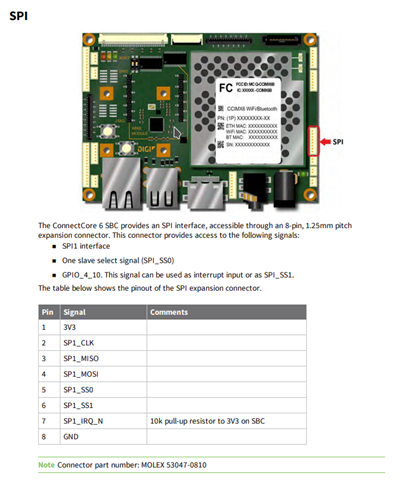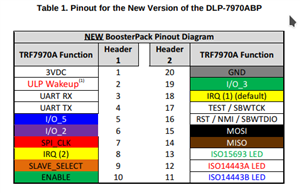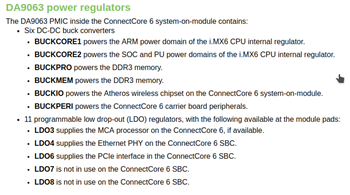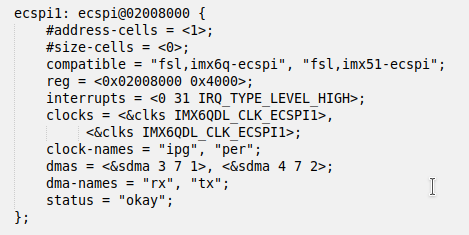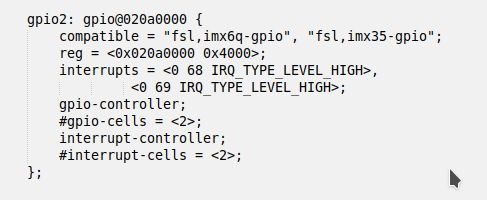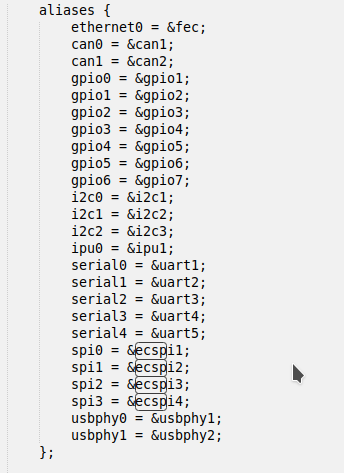Tool/software: Linux
I am trying to get the TRF7970A-based DLP7970ABP NFC Booster Pack board connected through SPI with a NXP/Freescale i.MX6Quad Cortex A9 SBC, and then to test it with neard.
I have tested adding spidev first to the device tree following this guide and I was able to successfully probe it and create an SPI loopback as the guide suggests. The device tree looked like this:
ecspi1 {
fsl,spi-num-chipselects = <1>;
cs-gpios = <&gpio2 30 GPIO_ACTIVE_HIGH>;
pinctrl-names = "default";
pinctrl-0 = <&pinctrl_ecspi1>;
status = "okay";
spidev0: spi@0 {
#address-cells = <1>;
#size-cells = <1>;
compatible = "spidev";
reg = <0>;
spi-max-frequency = <2000000>;
status = "okay";
};
};
I then removed spidev node and replaced it with a node for the TRF7970A:
ecspi1 {
fsl,spi-num-chipselects = <1>;
cs-gpios = <&gpio2 30 GPIO_ACTIVE_HIGH>;
pinctrl-names = "default";
pinctrl-0 = <&pinctrl_ecspi1>;
status = "okay";
nfc@0 {
#address-cells = <1>;
#size-cells = <1>;
compatible = "ti,trf7970a";
reg = <0>;
spi-max-frequency = <2000000>;
interrupt-parent = <&gpio2>;
interrupts = <23 IRQ_TYPE_LEVEL_HIGH>;
ti,enable-gpios = <&gpio4 10 GPIO_ACTIVE_HIGH>;
vin-supply = <&bperi>;
autosuspend-delay = <30000>;
irq-status-read-quirk;
en2-rf-quirk;
clock-frequency = <13560000>;
status = "okay";
};
};
I get the following messages while the kernel boots up (the following is a result of dmesg | grep spi):
spi_imx 2008000.ecspi: probed trf7970a spi0.0: No EN2 GPIO property spi0.0 supply vdd-io not found, using dummy regulator
The message on the second line comes from this line in the trf7970a.c driver file.
I have read the trf7970a.txt guidelines and that is why I omitted an EN2 parameter, as I thought it was optional. vdd-io is also optional.
No spi device is coming up in /dev/ as spidev did, and modprobe trf7970a does not return anything.
The pin description of ecspi1 is the following:
ecspi1 {
pinctrl_ecspi1: ecspi1 {
fsl,pins = <
MX6QDL_PAD_EIM_D17__ECSPI1_MISO 0x100b1
MX6QDL_PAD_EIM_D18__ECSPI1_MOSI 0x100b1
MX6QDL_PAD_EIM_D16__ECSPI1_SCLK 0x100b1
MX6QDL_PAD_EIM_EB2__GPIO2_IO30 0x100b1
MX6QDL_PAD_KEY_COL2__GPIO4_IO10 0x100b1
MX6QDL_PAD_EIM_CS0__GPIO2_IO23 0x100b1
>;
};
};
The following are the the pinouts for the SBC and DLP7970ABP board I'm using:
Apart from the obvious ones, I have connected:
SBC pin 5 (SS0) to pin 9 (Slave Select) of the TI board
SBC pin 6 (SS1) to pin 10 (Enable)
SBC pin 7 (SPI_IRQ) to pin 18 (IRQ (1) default)
I would like to test this device with neard, installed from this recipe, but I reckon something is wrong with the SPI parameters in the device tree node so I don't think I can do much with neard for now.
Do you think it's a wiring issue, an SPI node setup issue or some parameters are wrong in the device tree? I am quite lost at this point, any help is appreciated.


